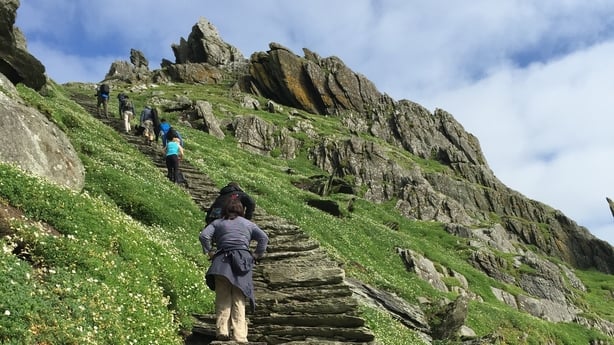The UNESCO site of Sceilg Mhichíl in Co Kerry has been selected as one of only ten sites globally, and as the only one in Europe, as a focus of a research project on climate change and its worsening effects on heritage.
The Office of Public Works-managed site, topped by the beehive St Fionán's monastery and valued also for its bird colony, is one of two UNESCO world heritage sites in Ireland.
It will be "observed" alongside other UNESCO sites such as Angkor Archaeological Park Cambodia, and the group of monuments at Cartagena Colombia, for the effects of climate change as part of a project funded by the National Geographic Society and Manulife.
There are two lead sites in the Preserving Legacies global study, Petra in Jordan and the Rice Terraces of the Philippine Cordilleras.
Sites such as Sceilg Mhichíl are facing increased threats due to climate change worldwide, the OPW said, welcoming the inclusion of the Kerry island.

The OPW and the National Monuments role will be to collaborate with other sites and place scientific research over a ten-year period.
The findings will be used as a template for the management of important sensitive sites.
Training of staff working with the south Kerry community surrounding Scelig Mhichíl is expected to begin shortly.
Minister of State for Heritage Malcom Noonan said it was "an honour for Ireland" to be part of this global programme.
"It is recognition of Sceilg Mhichíl's place in the pantheon of World Heritage sites and also of our obligations to ensure its protection. Our National Monuments Service team, with OPW, look forward to sharing our experiences, working with communities and learning from approaches elsewhere, as we join together to address what is a shared challenge of the impact of climate change on the world’s heritage," the minister said.
A senior lecturer in archaeology at Queen's University Belfast has said the extreme location of the UNESCO site of Sceilg Mhichíl was one of the reasons it was chosen as a focus of the research project.
Speaking on RTÉ's Morning Ireland, Dr Will Megarry said: 'It's a really exceptional and incredible site situated in one of the most extreme places in the planet. For thousands of years and more it's been subject to weather conditions, and like many sites around the world, it's now at risk and increasing risk from the impacts of climate change."
Mr Megarry said preserving somewhere like Sceilg Mhichíl is not about saving some old rocks on an island in the sea, but preserving heritage for the future.
Our past anchors us, he said, adding: "So preserving these places and teaching local communities how to preserve these places and working together, it's not just about saving old rocks on an island in the sea. It's about protecting a crucial part of who we are not just for us, but for future generations."
Dr Megarry said a big part of the preserving legacies project is about sharing experiences and seeing what can be learnt from different experiences.
He said the OPW is already doing "incredible works" on Sceilg Mhichíl to deal with the worst impacts of climate change.


